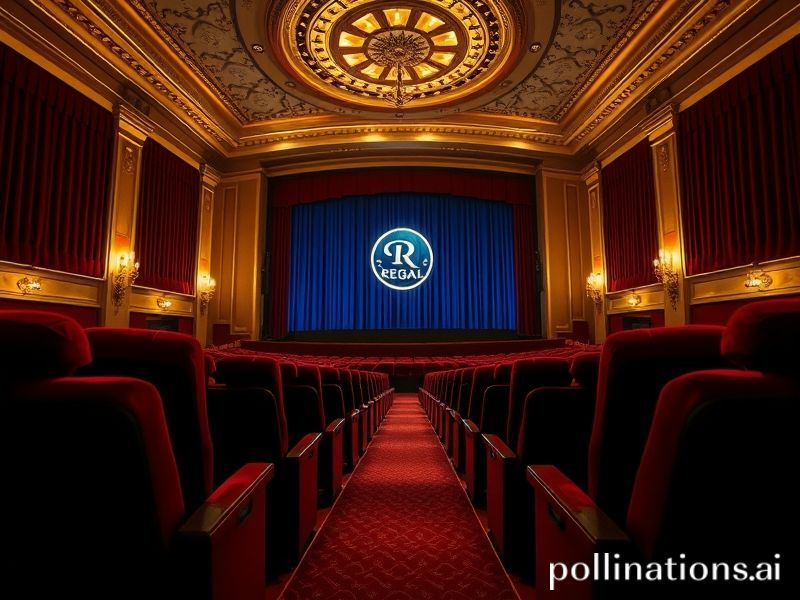Curtain Call for Regal: How the Last Global Cinema Empire Fell to Sofa Cinema
Regal Theaters: The Last Palace Guard of Global Escapism Falls to the Streaming Guillotine
The velvet curtains parted one final time this week, not for a royal premiere, but for the corporate obituary of Regal Cinemas—those red-roped pleasure domes that once flashed brighter than a Saudi prince’s Bugatti. Cineworld, Regal’s debt-sodden British parent, announced it will shutter or sell most of its 500 U.S. locations after a decade-long spree of empire-building worthy of a Victorian opium cartel. From Times Square to the air-conditioned bunkers of Kuwait City, the news landed with the thud of a dropped tub of over-salted popcorn. The message was as universal as the trailers for yet another superhero sequel: the global middle-class escape hatch is jamming shut.
Regal’s arc tracks the same parabola as many 21st-century illusions. First came the post-Cold-War promise that American mass culture could be franchised like Subway sandwiches—same Dolby squeal in Jakarta as in Joliet. Multiplexes sprouted faster than Chinese ghost cities, each promising a passport-free mini-America: bottomless soda, reclining seats, and the faint smell of moral superiority wafting off the screen. Investors salivated. Governments granted tax holidays. Local oligarchs saw a chance to launder reputation by offering “family values” in 24-screen installments.
Then came the plot twist nobody bothered to storyboard: the internet. Streaming services, those algorithmic vending machines of desire, realized you don’t need to pave paradise to put up a parking lot when you can simply beam paradise straight into a bedroom. Netflix alone now premieres more hours of content in a month than most nations produce in a year. Why schlep to a sticky-floored cathedral when your phone will deliver the same explosions between Slack notifications?
The pandemic merely applied the coup de grâce—an elegant French phrase for “final kick in the teeth.” Lockdowns turned living rooms into Cannes, complete with BYO rosé and a dress code of yesterday’s sweatpants. By the time the masks came off, audiences discovered that their couches reclined farther than Regal’s faux-leather Barcaloungers, and the popcorn was mercifully free of mysterious yellow dust. Box-office receipts outside China plummeted to numbers last seen when color film was cutting-edge. Even the Chinese, once the last reliable congregation, have started ghosting theaters in favor of government-approved streaming apps that pause automatically for ideological reflection.
Cue the international blame game. Hollywood studios blame “windowing,” the quaint tradition of letting cinemas hog new releases for 90 days before the streaming peasants get a look. European exhibitors blame the Americans for feeding them bloated franchise gruel. Everyone blames the hedge funds that loaded Regal with enough debt to bankroll a medium-sized war. Meanwhile, the ghost of Adam Smith cackles somewhere over the Atlantic: turns out that when you sell an identical experience from Lagos to Lisbon, a single microbe—or broadband upgrade—can torpedo the entire supply chain.
Collateral damage is deliciously global. In Latin America, where malls doubled as climate-controlled public squares, shuttered Regals leave teenagers with nothing to do but return to actual plazas—terrifying civic leaders who assumed public space had been successfully privatized. In India, PVR executives break into a cold sweat at every WhatsApp rumor that Hollywood might go day-and-date streaming, threatening their gold-class recliner temples to conspicuous consumption. Even the Gulf states, never shy about subsidizing marble-clad fantasies, now wonder whether the next generation will prefer a VR headset over an IMAX screen the size of a football field.
And yet, like any good tragedy, the ending is laced with farce. Liquidators are auctioning off popcorn machines that once symbolized the American century; the machines will likely be shipped to Africa to pop sorghum instead. Projection booths are being retrofitted into crypto-mining farms—because nothing says “cultural progress” like replacing Tom Cruise with a whirring rack of GPUs solving Sudoku for imaginary money. Meanwhile, nostalgic cinephiles in Seoul and São Paulo stage “save our screens” protests, waving artisanal signs printed on sustainably sourced cardboard that cost more than a monthly Netflix subscription.
Perhaps the real takeaway is simpler. Regal’s fall isn’t just about movies; it’s about the slow-motion collapse of any shared, physical ritual that can’t be individualized, monetized, and data-harvested in real time. When the lights go down for good, we’ll still have stories—just fewer places to cry, laugh, or neck in the dark with strangers who smell faintly of hot dogs and existential dread. The world will keep spinning, albeit on a slightly smaller, lonelier axis.
Take your final bow, Regal. The credits are rolling, the ushers have switched off the neon, and somewhere a server farm hums the overture to our next collective dream—buffering, buffering, buffering…







